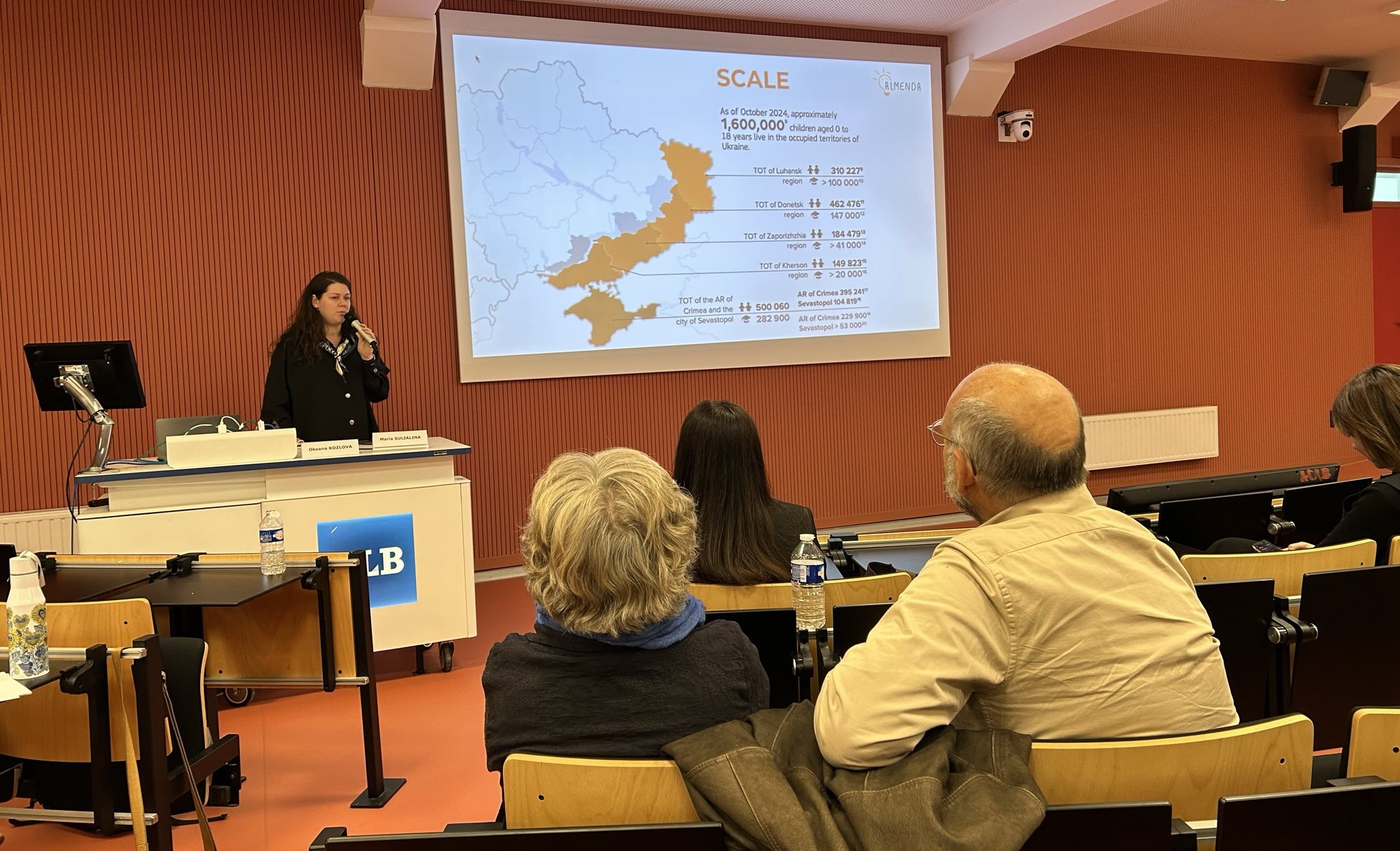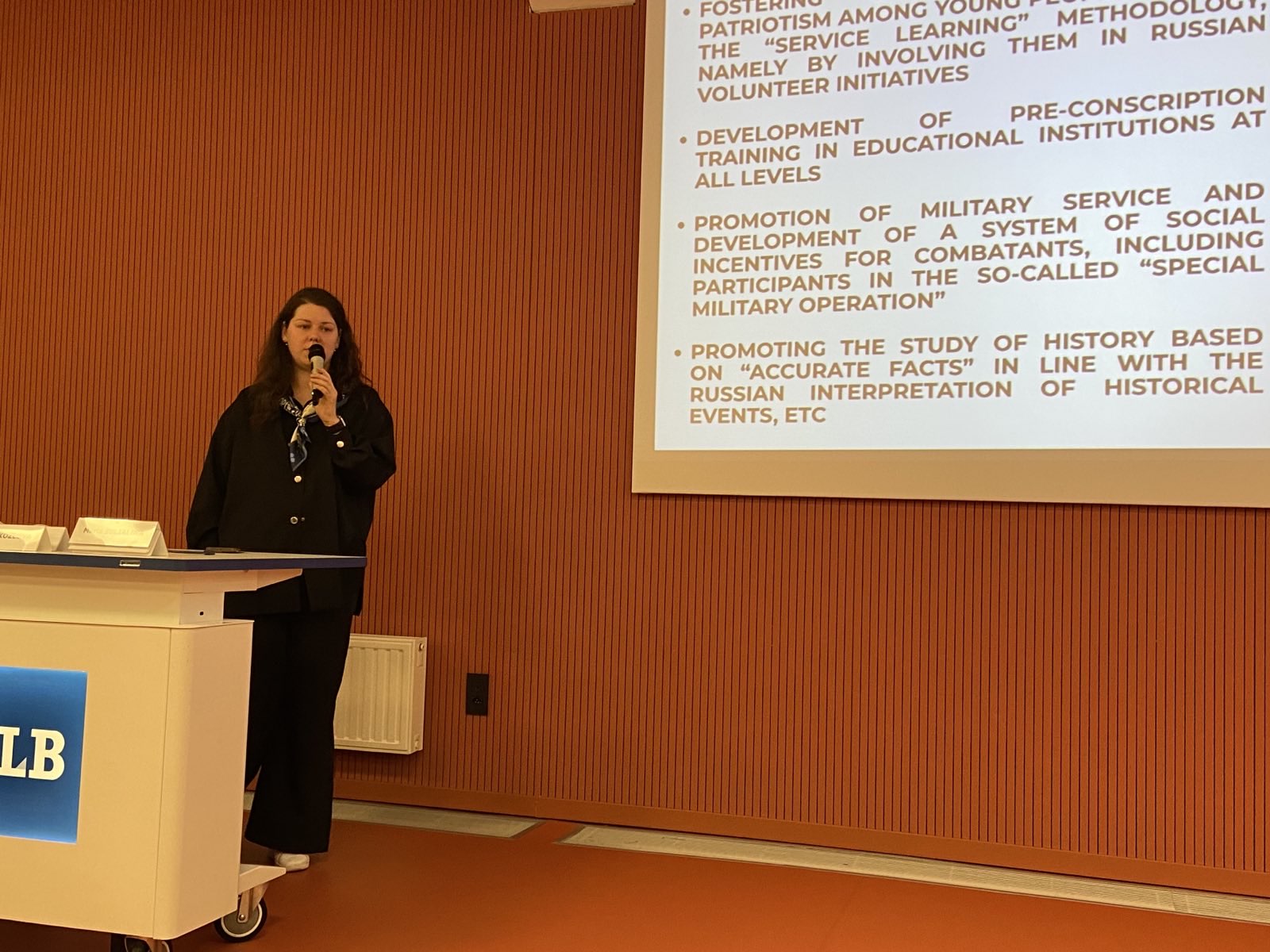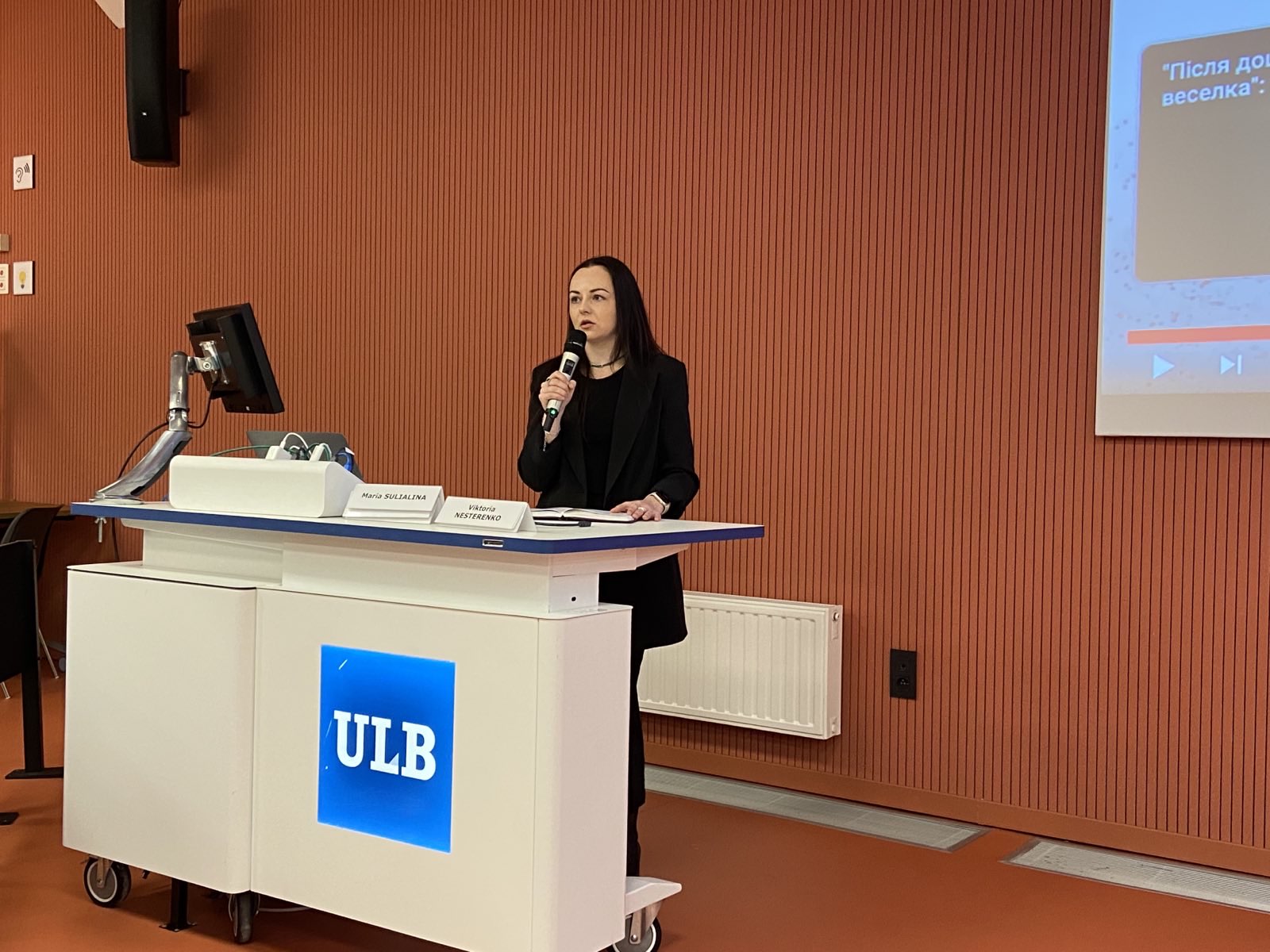The fifth day of Crimea Week in Brussels: experts discussed youth under occupation and children of political prisoners
The last day of Crimea Week in Brussels focused on the children living on the Ukrainian peninsula, which has been under Russian occupation for 11 years. The Free University of Brussels (The Université libre de Bruxelles) hosted a lecture entitled “Children Under Occupation: Indoctrination, Militarization and Persecution of Ukrainian Youth in Occupied Crimea”, as well as an exhibition of illustrations about life under occupation entitled “U(CRIME)A”. Mariia Sulialina from the Centre of civil education “Almenda”, Viktoriia Nesterenko from ZMINA and Artem Oliinyk from Crimea SOS joined the discussion. The event was moderated by lecturer Oksana Kozlova.

Since the full-scale invasion, the Russians have significantly ramped up their propaganda in the occupied territories of Ukraine through the education system. In particular, Russian textbooks – which immediately replaced Ukrainian ones in schools – emphasise the narrative that Ukraine does not exist as an independent state.
“Ukraine is mentioned only in some parts of history as an artificially created state. And the thing is that our children are not raised to believe that Ukraine is an enemy. They are raised to believe that Ukraine does not exist at all“, said Mariia Sulialina.
The activist specified that during the 2014 – 2023 occupation, 131,000 children graduated from 11th grade in Crimea, which is temporarily controlled by the Russian Federation. This is a generation of young people who have never been in the Ukrainian education system, only in the Russian one. Most of them cannot continue their lives in Ukraine because they do not have Ukrainian educational documents. Sulialina recalled that, according to information from the Ministry of Education and Science of Ukraine, during this period, only 4% (3,922) of more than 500,000 Crimean children received Ukrainian educational documents.
What is happening to Ukrainian children under occupation, she described as the systematic destruction of national identity: “Why do we call it a system? Because we see how Russia is working systematically at all levels. First and foremost, this is happening through formal education, because children have no choice but to go to school and receive a Russian education, but they are also building their own network of informal education“.

The occupiers are widely militarising formal education by creating cadet classes. In these classes, children from the first grade wear uniforms and are placed under the patronage of various forces: the FSB, the Investigative Committee, etc.
The main aim of these classes is to prepare children to either become soldiers straight away or enrol in military universities to become Russian officers. As of January 2025, 260 such classes had been opened in the occupied territories, and their number is expected to continue growing.
“All this is already having consequences in the occupied territories. In Crimean schools, memorial plaques are being installed for former students who died in the Russian-Ukrainian war. They were children when Russia occupied their land and were subjected to a system of political indoctrination and militarisation. At some point, they began to believe in this system, then went to war against their own country and died”, said the human rights defender.

Viktoriia Nesterenko from ZMINA also emphasised that the lives of hundreds of children of Crimean political prisoners on the occupied peninsula can change in a single morning. In 2015, Russian special services began fabricating the first cases against political prisoners — the “26 February” case, the first case against Hizb ut-Tahrir, resulting in 12 children becoming children of political prisoners. In 2016, special services initiated new criminal cases: the “Yalta case”, the “Simferopol case”, and the “Bakhchysarai case”. By then, the number of such children had risen to 32. By 2022, that number had grown to 239, 197 of whom were minors.
Most Crimean Tatar political prisoners are parents of large families. For example, physical education teacher Server Zekiriaiev is the father of 13 children, citizen journalist Marlen Asanov is the father of four children, and citizen journalist Tymur Ibrahimov is the father of four children. The family of political prisoner Aider Dzheparov has eight children; his arrest forced his ninth-grade son to drop out of school and start working.
There is a separate category of children who were born after their fathers were arrested and have never seen them. There are also more than 50 children with serious chronic illnesses, most of which were caused by the arrests of their fathers. Detentions are often carried out in a demonstrative manner, with the use of violence and in the presence of the families of political prisoners.
“In front of my two children and my wife, they hit me, I fell down and they started kicking me. There were about seven of them. Then they put a black garbage bag over my head, taped it around, took me outside and threw me into a car“, wrote political prisoner Ruslan Abdurakhmanov.
Such testimonies, collected during the last day of Crimea Week in Brussels, once again demonstrate that the occupation of Crimea is not only about geopolitics, but above all about the broken lives of thousands of Ukrainian children. Ideological pressure, militarisation and the systematic suppression of Ukrainian identity are creating a new reality in which children are becoming tools of a foreign state. That is why the international community must not forget about Crimea and is obliged to support efforts to de-occupy, reintegrate and protect the rights of the most vulnerable – children who have the right to a future free from fear, propaganda and war.

The event was held with the support of the Free University of Brussels (ULB), the European Network for Solidarity with Ukraine in Belgium, the Maison des Sciences Humaines of the ULB, and the ULB Faculty of Letters, Translation and Communication within the framework of Crimea Week.
For reference: Crimea Week is a series of high-level discussions, cultural events, exhibitions, documentary film screenings and exchanges of expertise aimed at strengthening European engagement on the issue of Crimea, the Ukrainian peninsula that has been under Russian occupation since 2014. This initiative highlights the harsh reality of the residents of Crimea – including Crimean Tatars, human rights defenders and independent voices – who continue to demonstrate resilience despite systematic repression since the occupation of the peninsula in 2014. The event is organised by Ukrainian and international civil society in close cooperation with EU institutions, Permanent Representations and the Mission of Ukraine to the EU.
If you have found a spelling error, please, notify us by selecting that text and pressing Ctrl+Enter.















